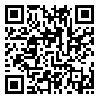Volume 2, Issue 3 (2022)
jpt 2022, 2(3): 209-221 |
Back to browse issues page
Download citation:
BibTeX | RIS | EndNote | Medlars | ProCite | Reference Manager | RefWorks
Send citation to:



BibTeX | RIS | EndNote | Medlars | ProCite | Reference Manager | RefWorks
Send citation to:
Ghalbi F. گستردهگرایی در دامنه: در دفاع از سوزا. jpt 2022; 2 (3) :209-221
URL: http://jpt.modares.ac.ir/article-34-64233-en.html
URL: http://jpt.modares.ac.ir/article-34-64233-en.html
Analytical Philosophy Research Institute, Fundamental Knowledge Research Institute, Tehran, Iran , farazghalbi@ipm.ir
Abstract: (1957 Views)
Kripke’s modal argument against the descriptive theory of names (descriptivism) is based on the idea that descriptivism cannot explain the intuitions arising from the rigidity of proper names. One answer to the modal argument is widescopism. In this paper, I first introduce the modal argument and widescopism. I, then, explain how Kripke and Soames argue against widescopism. In the next stage, I reconstruct Sosa’s answer to Kripke’s and Soames’s. After that, I turn to Caplan's argument against Sosa's solution. According to Caplan, Sosa's solution leads to the loss of the main and primary intuitions of descriptivism. I try to show that Sosa can defend his solution against Caplan.
Article Type: Original Research |
Subject:
Philosophy of Language (Analytical)
Received: 2022/04/25 | Accepted: 2022/08/11 | Published: 2022/09/19
Received: 2022/04/25 | Accepted: 2022/08/11 | Published: 2022/09/19
References
1. Caplan B (2005). Against widescopism. Philosophical Studies. 125(2):167-90. [Link] [DOI:10.1007/s11098-004-7814-1]
2. Dummett M (1973). Frege: Philosophy of language. New York: Harper and Row. [Link]
3. Hunter D (2005). Soames and widescopism. Philosophical Studies. 123(3):231-241. [Link] [DOI:10.1007/s11098-004-5359-y]
4. Kaplan D (1989a). Demonstratives. In: Almog J, Perry J, Wettstein H, editors. Themes from Kaplan. Oxford: Oxford University Press. pp. 481-563. [Link]
5. Kaplan D (1989b). Afterthoughts. In: Almog J, Perry J, Wettstein H, editors. Themes from Kaplan. Oxford: Oxford University Press. pp. 565-614. [Link]
6. Kripke S (1980). Naming and necessity. Cambridge, MA: Harvard University Press. [Link]
7. McCulloch G (1989). The game of the name: Introducing logic, language and mind. Oxford: Oxford University Press. [Link]
8. Quine WVO (1960). Word and object. Cambridge: MIT Press. [Link]
9. Salmon NU (1981). Reference and essence. Princeton: Princeton University Press. [Link]
10. Soames S (1998). The modal argument: Wide scope and rigidified descriptions. Nous. 32(1):1-22. [Link] [DOI:10.1111/0029-4624.00084]
11. Soames S (2002). Beyond rigidity: The unfinished semantic agenda of naming and necessity. New York: Oxford University Press. [Link] [DOI:10.1093/0195145283.001.0001]
12. Sosa D (1996). Representation thoughts and language [dissertation]. Princeton, NJ: Princeton University. [Link]
13. Sosa D (2001). Rigidity in the scope of Russell's theory. Nous. 35(1):1-38. [Link] [DOI:10.1111/0029-4624.00286]
Send email to the article author
| Rights and permissions | |
 |
This work is licensed under a Creative Commons Attribution-NonCommercial 4.0 International License. |






